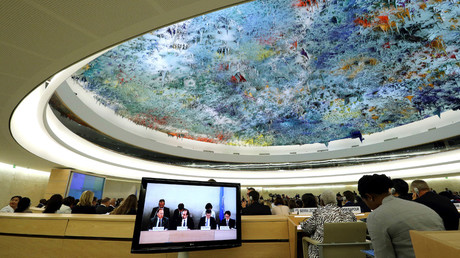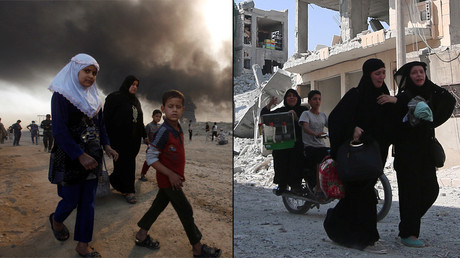High-profile journalists, politicians, researchers and financial experts have flocked to the Russian Black Sea resort of Sochi to talk current politics.
High-profile journalists, politicians, researchers and financial experts have flocked to the Russian Black Sea resort of Sochi to talk current politics. The Valdai discussion clubs opens amid a deepening chasm between Moscow and the West.
The 13th annual session of the Valdai International Discussion Club is being held on October 25-27.
“Tensions that naturally result between the major powers” as well as tools to “preserve the peace,” are among the topics chosen by the organizers for the first day. The crisis of democracy, staggering migrations, as well as the clash between globalization and protectionism are also set to be on agenda.
Two Worlds,Two Playbooks: Why Moscow and Washington Don’t Understand Each Other valdaiclub.com/a/highlights/t…#Valdai2016
During the unofficial session of the club on Monday, the organizers introduced a special ‘Valdai’ prize. The trophy will be granted by a selected committee for the contribution to the analyses of “global processes.”
At least 130 high-profile representatives of some 35 nations are expected to attend the discussions. This year, for the first time in the event’s history, a representative of Syria will be present at the debate, organizers said. Abdullah Abdel Razzaq Al-Dardari, Deputy Executive Secretary of the United Nations Economic and Social Commission for Western Asia (ESCWA) will join Russian First Deputy Prime Minister Igor Shuvalov and Foreign Minister Sergey Lavrov in discussing the tensions in Syria.
While the Russian president Vladimir Putin has yet to confirm his appearance at the forum, organizers eagerly anticipate his attendance.
“From the Russian participants, we have traditionally invited the state authorities. We hope to be able to see Russian President Vladimir Putin,” organizer Andrey Bystritskiy told reporters
This year’s Valdai gathering comes as relations between Moscow and the West are particularly strained. The crisis in Syria will be a major part of the discussion during the first day of the gathering. Relations between Moscow and its western partners have deteriorated following Russian strikes against Islamic State (IS, formerly ISIS/ISIL) and other terrorist groups, on the request of the Syrian leader Bashar Assad.
On October 7, US State Secretary John Kerry urged an international “war crimes” investigation against Moscow and Damascus over the campaign in Syria. Nearly two weeks later, the UN Human Rights Council (UNHRC) voted to start an independent inquiry into the alleged human rights violations in the Syrian city of Aleppo. A document from the Office of the UN Commissioner for Human Rights put the blame for “overwhelming majority” of civilian casualties there on Damascus and its allies. The paper however also stated that the militants “continue to fire mortars and other projectiles into civilian neighborhoods” of government-held West Aleppo.
#Aleppo: A Prelude to the Liberation Operation. All the forces are thrown. valdaiclub.com/a/highlights/a… #Syria
Moscow has insisted that the Russian and Syrian strikes in East Aleppo are targeting terrorists, including those of Al-Qaeda affiliate Jabhat al-Nusra, who have repeatedly violated all ceasefire attempts. On October 18, Russia and Syria ceased the bombardment and two days later started a three-day humanitarian pause to let both civilian residents and militants leave the enclave. However, not a single civilian was allowed to leave East Aleppo. Russian Foreign Minister Sergey Lavrov voiced his frustration on the issue in a telephone call with Kerry on Monday.
“Illegal armed groups holding East Aleppo responded to the humanitarian pause put in place by the Syrian government with the shelling of civilians attempting to leave the city,” Lavrov said. The Russian foreign minister once again urged the US to stick to its promise and force Washington-backed opposition to separate itself from terrorists.
Russian involvement in the Syrian crisis has been cited as a reason for some 80 international rights organizations – including Human Rights Watch – to call for depriving Moscow of its seat at the UNHRC. A petition has been already signed by the groups, AFP reported on Monday.
While Russia is being slammed for allegedly bombing civilians in Aleppo, the US-led coalition is currently assisting Iraqi forces in retaking the key city of Mosul from IS, amid UNs’ own warnings of the looming humanitarian catastrophe. Addressing the situation, White House spokesman John Earnest said that delaying the operation due to humanitarian concerns “does not make sense.”
Another point of conflict between Russia and the West is the accusation from Washington that Moscow is behind the hacking of emails and documents belonging to American officials and institutions.
“The US Intelligence Community is confident that the Russian Government directed the recent compromises of e-mails from US persons and institutions,” said a statement from the Office of National Intelligence and the Department of Homeland Security on October 7. However, no public evidence backing this strong assumption has been delivered. Moscow has brushed off the accusation as “nonsense”.
“This is yet another fit of nonsense! Tens of thousands of hackers [try to break into] President Putin's website daily. Many of these attacks can be traced to the United States. Yet we do not blame the White House or Langley every time,” said Dmitry Peskov, spokesman for the Russian president.
Russia’s deployment of ‘Iskander’ missile systems to the country’s exclave of Kaliningrad near Poland sparked an outcry from some of the neighboring countries in October.
“The deployment not only increases tensions in the region, but also possibly violates international treaties,” Lithuania’s Foreign Minister Linas Linkevicius said. The stationing was “part of the drill,” the deputy head of the Defense Committee in Russia’s Federation Council, Frants Klintsevich, countered.
General Igor Konashenkov, spokesman for the Russian Defense Ministry, added that the relocation of Iskanders was not “a big secret” and has been done openly. The missiles had been placed in Kaliningrad before.
In July, NATO announced a beef-up of its troops near the Russian border by stationing of up to 4,000 soldiers in Poland, Lithuania, Latvia and Estonia starting in 2017. Washington will also place a heavy brigade in Poland on a rotating deployment.










No comments:
Post a Comment
Note: only a member of this blog may post a comment.